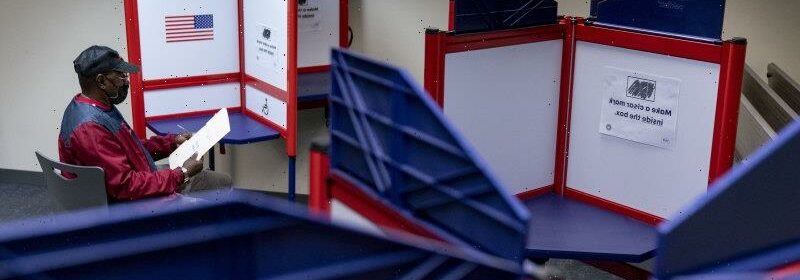First known China-based influence operation focused on US midterms detected on Facebook

San Francisco: Meta Platforms said on Tuesday it disrupted the first known China-based influence operation focused on targeting users in the United States with political content ahead of the midterm elections in November.
According to Meta’s report, the Chinese fake accounts posed as liberal and conservative Americans in different states. They posted political memes and lurked in the comments of public figures’ posts since November 2021.
The network maintained fake accounts across Meta’s social media platforms Facebook and Instagram, as well as competitor service Twitter, but was small and did not attract much of a following, Meta said in a report summarising its findings.
Cornelius Whiting fills out his ballot at an early voting location in Alexandria, Virginia.Credit:AP
Still, the report noted, the discovery was significant because it suggested a shift toward more direct interference in US domestic politics compared with previous known Chinese propaganda efforts.
“The Chinese operations we’ve taken down before talked primarily about America to the world, primarily in South Asia, not to Americans about themselves,” Meta global threat intelligence lead Ben Nimmo told a press briefing.
“Essentially the message was ‘America bad, China good,’” he said of those operations, while the new operation pushed messages aimed at Americans on both sides of divisive issues like abortion and gun rights.
Another Meta executive at the briefing said the company did not have enough evidence to say who in China was behind the activity.
Asked about Meta’s findings at a news conference, US Attorney General Merrick Garland said his office was “very concerned” about intelligence reports of election interference by foreign governments “starting back some time ago and continuing all the way into the present”.
A Twitter spokesperson said the company was aware of the information in Meta’s report and also took down the accounts.
A sample screenshot showed one account commenting on a Facebook post by Republican Senator Marco Rubio, asking him to stop gun violence and using the hashtag #RubioChildrenKiller.
The same network also set up fake accounts that posed as people in the Czech Republic criticising the Czech government over its approach to China, according to the report.
Meta also said it had intercepted the largest and most complex Russian-based operation since the war in Ukraine began, describing it as a sprawling network of more than 60 websites impersonating legitimate news organisations, along with about 4000 social media accounts and petitions on sites like US-based campaign group Avaaz.
That operation primarily targeted users in Germany, as well as France, Italy, Ukraine and the United Kingdom, and spent more than $US100,000 on ads promoting pro-Russian messages.
The operation involved more than 60 websites created to mimic legitimate news sites including The Guardian newspaper in the United Kingdom and Germany’s Der Spiegel. Instead of the actual news reported by those outlets, however, the fake sites contained links to Russian propaganda and disinformation about Ukraine. More than 1600 fake Facebook accounts were used to spread the propaganda to audiences in Germany, Italy, France, the U.K. and Ukraine.
The findings highlighted both the promise of social media companies to police their sites and the peril that disinformation continues to pose.
“Video: False Staging in Bucha Revealed!” claimed one of the fake news stories, which blamed Ukraine for the slaughter of hundreds of Ukrainians in a town occupied by the Russians.
The fake social media accounts were then used to spread links to the fake news stories and other pro-Russian posts and videos on Facebook and Instagram, as well as platforms including Telegram and Twitter. The network was active throughout the summer.
“On a few occasions, the operation’s content was amplified by the official Facebook pages of Russian embassies in Europe and Asia,” said David Agranovich, Meta’s director of threat disruption. “I think this is probably the largest and most complex Russian-origin operation that we’ve disrupted since the beginning of the war in Ukraine earlier this year.”
Researchers said they couldn’t directly attribute the network to the Russian government. But Agranovich noted the role played by Russian diplomats and said the operation relied on some sophisticated tactics, including the use of multiple languages and carefully constructed imposter websites.
Since the war began in February, the Kremlin has used online disinformation and conspiracy theories in an effort to weaken international support for Ukraine. Groups linked to the Russian government have accused Ukraine of staging attacks, blamed the war on baseless allegations of US bioweapon development and portrayed Ukrainian refugees as criminals and rapists.
Reuters, AP
Get a note directly from our foreign correspondents on what’s making headlines around the world. Sign up for the weekly What in the World newsletter here.
Most Viewed in World
From our partners
Source: Read Full Article
